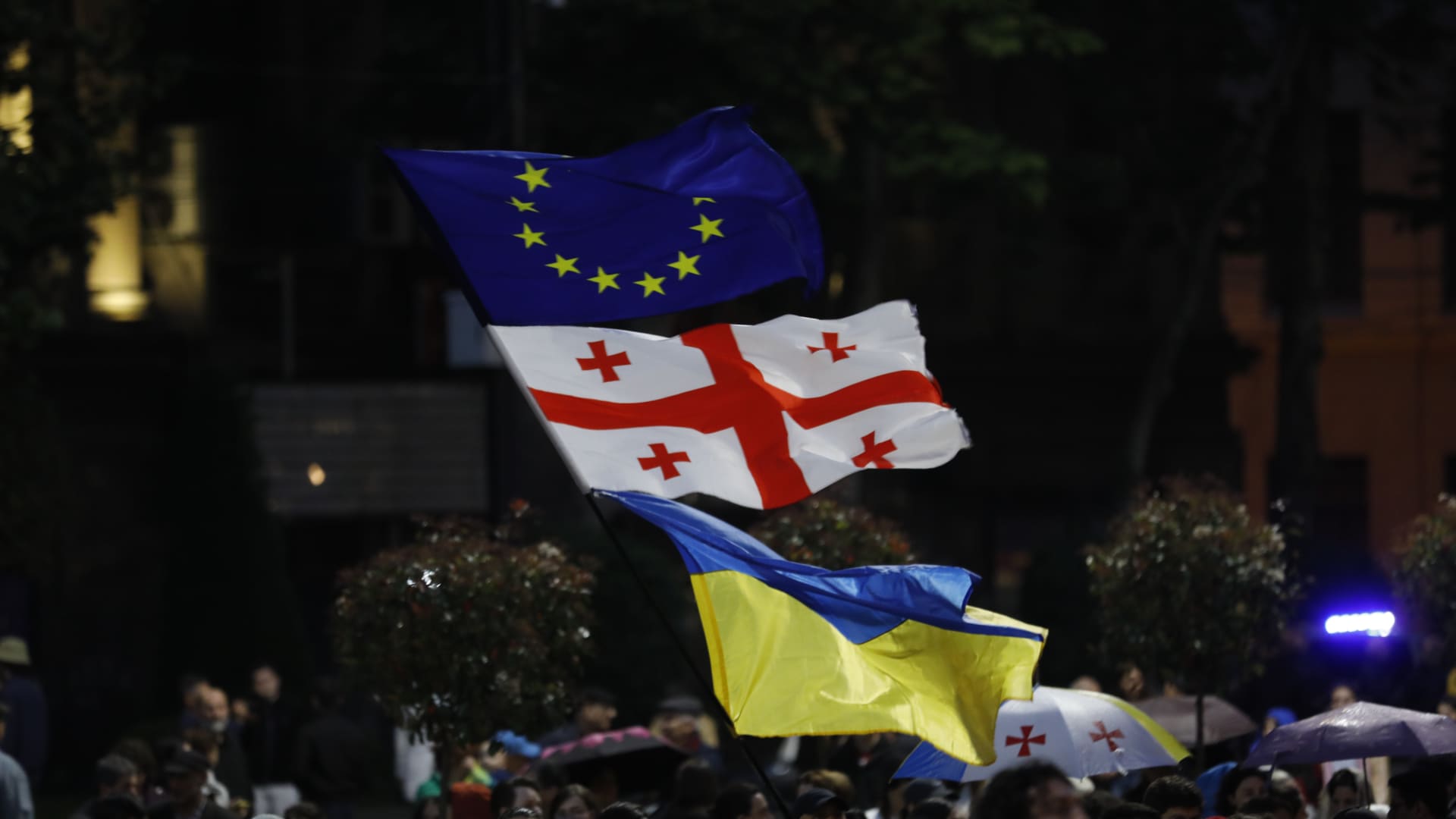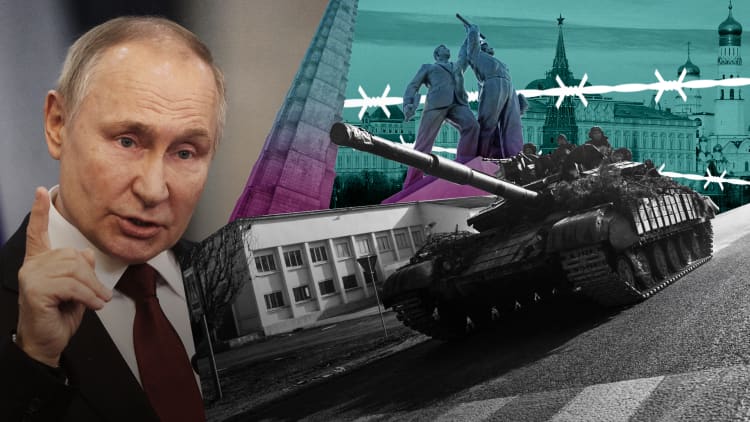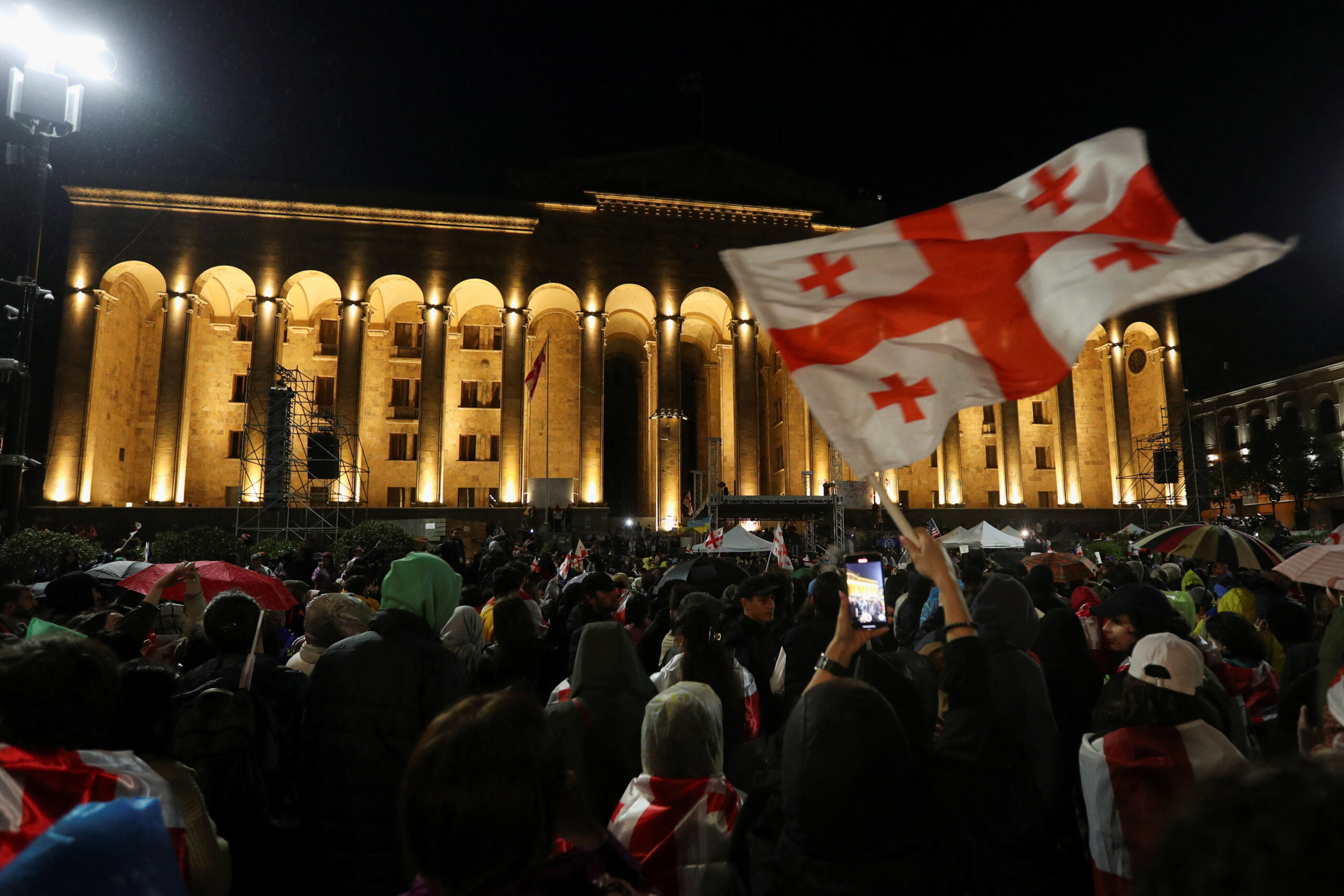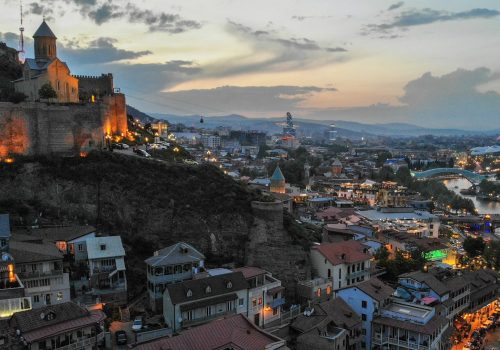Georgia
These economies benefited from Russia’s isolation — but they now risk Western retaliation

People gathered in the streets of Tbilisi in May to protest after a Russian passenger plane landed in the Georgian capital, completing the first direct flight from Moscow after a four-year hiatus, on May 20, 2023.
Anadolu Agency | Anadolu Agency | Getty Images
Caucasus countries Georgia and Armenia, whose economies unexpectedly boomed in the wake of the war in Ukraine, are now facing the prospect of Western retaliation following a spike in trade with Russia.
The two former Soviet states near Russia’s southern border surged to double-digit growth last year as an uptick in Russian workers, wealth and trade supercharged their wider post-Covid recoveries.
Georgia’s economy grew 10.1% in 2022, while Armenia’s jumped 12.6%, according to International Monetary Fund data. In 2023, their growth is set to slow to around 4% and 5.5%, respectively, reflecting a general moderation across the wider Caucasus and Central Asia region, the U.N. agency said.
Still, analysts say the fundamental growth drivers “haven’t disappeared,” and could put those countries under the international spotlight.
“The reason we haven’t decelerated as much as we could have is that we took advantage of Russia being sidelined by the rest of the world,” Mikheil Kukava, head of economic and social policy at Georgian think tank the Institute for Development of Freedom of Information, told CNBC via zoom.
‘Intermediated’ trade with Russia
Western leaders have raised alarm bells this year that certain traders are using countries such as Armenia, Georgia, Kazakhstan and Turkey to evade sanctions on Russia.
In its latest economic outlook, the European Bank for Reconstruction and Development noted that such countries were becoming so-called intermediated trade partners for the isolated state.
“Exports from the European Union, United Kingdom and United States to Central Asia and the Caucasus [have] increased dramatically, hinting at the rise of ‘intermediated trade,’ whereby goods are being exported to Central Asian economies and are then sold onwards to Russia,” the EBRD said.
Changing trade patterns in the region are an opportunity, but also a risk.
Subir Lall
deputy director at the IMF
This year, Russia has emerged as Georgia’s second-largest trading partner by imports and its third-largest trading partner by exports, according to preliminary data from Georgia’s National Statistics Office, Geostat. Through 2022, Russian imports into the country rose 79%, while exports to Russia were up 7%.
Meantime, Russia is Armenia’s largest trading partner in terms of both imports and exports. Kyrgyzstan, Tajikistan and Azerbaijan, as well as other countries in the region, have also recorded a surge in trade with Russia over the past year, IMF data shows.
“Changing trade patterns in the region are an opportunity, but also a risk,” Subir Lall, the IMF’s deputy director of the Middle East and Central Asia, said during a briefing earlier this month.
Spokespersons for the Georgian and Armenian governments did not immediately respond to CNBC’s request for comment on the uptick, nor did they provide a breakdown of the specific goods traded with Russia.
However, Geostat data showed that cars, petrol and unspecified “other commodities” accounted for the vast majority of Georgia’s trade on a general basis. Of particular note, the number of vehicles, aircraft and vessels exported to Russia quadrupled in 2022 and is currently around double 2021 levels.
“I can’t remember a time when Russia was Georgia’s leading trading partner — both in import and export. Some items saw a 1,000% increase or 500% increase. That’s suspicious, right?” Kukava said.
“Even though there’s nothing illegal here — they’re not sanctioned goods — we suspect that it’s dual use items, like washing machines, that can be put to so many uses,” he added, who noted that the parts from such items could be repurposed in military and microchip products.
Crackdown on sanctions circumvention
The burgeoning trade flows have prompted calls from the European Union and allied nations to either get such countries on board with sanctions, or slap those countries themselves with secondary sanctions.
A spokesperson for the European Commission, the EU’s executive arm, told CNBC that it is currently working to “spot the redirection of trade flows from certain third countries acting as possible gateways to Russia.”
That follows comments earlier this month from European Commission President Ursula von der Leyen, who said the group’s 11th package of sanctions against Russia would focus on “cracking down on circumvention” in coordination with Group of Seven nations.
For Armenia, being compliant with the sanctions is an absolute priority.
Armen Nurbekyan
Deputy Governor of the Central Bank of Armenia
The EBRD now estimates that such “intermediated trade” accounts for around 4-6% of annualized gross domestic product in Armenia and Kyrgyzstan. That, in turn, is boosting the countries’ “burgeoning logistics industries,” and underpinning the appreciation of local currencies, it said.
However, Armenia’s central bank Deputy Governor Armen Nurbekyan insisted that authorities are observing the country’s trade patterns on a weekly basis to ensure businesses are not falling foul of the embargoes.
“For Armenia, being compliant with the sanctions is an absolute priority,” Nurbekyan told CNBC. “We are in a region which is very turbulent, so we know what it means to be around countries which are under sanctions, and I think we have been quite successful in steering our economy in a way that we stay away from the problematic cases.”
Nurbekyan noted that trade increases had been seen “across the board” — including in food processing, agricultural goods, and cars — as domestic businesses have taken advantage of increased demand following the exodus of Western businesses from Russia.
He acknowledged that the percentage increase in demand for advanced technology parts, in particular, had been “quite big,” but said that was because levels had started from a low base.
“No one is so naive to assume that given the size of the sanctions, given the size of the flows, that anybody can avoid any risks. That is never the case. But our modus operandi is always that … we ensure that compliance in our financial institutions and more generally is of a higher standard [to other countries]. We not going to be opportunistic, in short,” he added.
Jeopardizing Western relations
Western allies have not yet specified what their next round of sanctions will look like, nor when they might come into effect. However, some analysts say that the prospect of them could push affected countries to rethink their allegiances.
“We need to wean ourselves off this dependence on the Russian economy,” Kukava said.
“This is a pariah country and economic dependence on them means we won’t be able to trade with the EU and the U.S. and the Western countries. The growth needs to come from trade with them, rather than with Russia,” he added.
That’s especially true for nations that aspire to EU and NATO membership.
We are adding fuel to the fire by intensifying this trade relationship with Russia.
Mikheil Kukava
head of economic and social policy at the Institute for Development of Freedom of Information
Georgia applied for EU membership in March 2022, one week after Russia’s full-blown invasion of Ukraine, and is working toward candidate status. The country, alongside Ukraine, has declared its aspirations to NATO membership.
Georgian public support for EU membership has resurged over recent months, with four-fifths (81%) of the population currently in favor joining the bloc, according to a recent poll from U.S.-founded non-profit the National Democratic Institute. Three-quarters (73%) continue to support NATO membership.
Armenia, meanwhile, has never submitted an application for either membership, and other Central Asian countries would not be eligible to join the EU.
“We are adding fuel to the fire by intensifying this trade relationship with Russia. The geopolitical context with which we [Georgia] are now thought of is with other Central Asia countries. But they don’t have EU membership as a target — we do,” Kukava said.


Georgia
Georgia softball live score updates in NCAA Athens Regional vs. Liberty
Georgia softball advances to the second round in the NCAA Athens Regional after defeating UNCW 8-0 on Friday afternoon.
The Bulldogs will face Liberty at 11 a.m. Saturday on ESPN+. The Lady Flames defeated Charlotte in game one Friday afternoon 6-3.
Since this is a double elimination tournament, the winner of Georgia’s second round matchup will head to the finals and the loser will get one more shot at glory at 6 p.m. against the winner of UNCW/Charlotte’s 3:30 p.m. game.
The winner of the entire Athens Regional will advance to the Super Regionals against the winner of the Los Angeles Regional, which houses national No. 6 seed UCLA, Grand Canyon, San Diego State and Virginia Tech.
This is the second time Georgia has hosted back-to-back regionals, dating back to the triple host gig they had between 2014-2016. It is the 23rd straight NCAA Tournament made by Georgia, not including the canceled 2020 season. Georgia had advanced to last year’s super-regional rounds. The Bulldogs have advanced to the Women’s College World Series five times, last in 2021, never bringing home the title.
Scouting report: Who has edge in 2024 NCAA Athens Regional?
‘Ubuntu’: Why Georgia softball has adopted this African philosophy as 2024 team motto
Portal: Georgia softball has become a landing point for curious ACC transfers like these four
What channel is Georgia vs. Liberty?
TV channel: ESPN+
Livestream: WatchESPN
Georgia softball start time vs. Liberty
Date: Saturday, May 18
Time: 11 a.m. ET
Location: Jack Turner Stadium; Athens, Ga.
Georgia softball live score updates vs. Liberty
Georgia softball 2024 schedule
| Date & Time | Opponent | Location | Results |
|---|---|---|---|
| Feb. 9 (Red & Black Showcase) @ 3:30 p.m. | Murray State | Athens | W, 11-0 (5 inn.) |
| Feb. 9 (Red & Black Showcase) @ 6 p.m. | South Dakota | Athens | W, 4-0 |
| Feb. 10 (Red & Black Showcase) @ 1 p.m. | Murray State | Athens | W, 2-0 |
| Feb. 10 (Red & Black Showcase) @ 3:30 p.m. | Purdue | Athens | W, 6-1 |
| Feb. 11 (Red & Black Showcase) @ Noon | Purdue | Athens | W, 5-1 |
| Feb. 15 (Shriners Children’s Clearwater Inv.) @ 1 p.m. | Wisconsin | Clearwater, Fla. | W, 7-6 (10 inn.) |
| Feb. 16 (Shriners Children’s Clearwater Inv.) @ 1 p.m. | Oklahoma State | Clearwater, Fla. | W, 7-4 |
| Feb. 16 (Shriners Children’s Clearwater Inv.) @ 1 p.m. | UCLA | Clearwater, Fla. | W, 7-2 |
| Feb. 17 (Shriners Children’s Clearwater Inv.) @ 1 p.m. | Florida State | Clearwater, Fla. | W, 20-10 (5 inn.) |
| Feb. 17 (Shriners Children’s Clearwater Inv.) @ N/A | Minnesota | Clearwater, Fla. | Canceled |
| Feb. 23 (Georgia Classic) @ 5:30 p.m. | Virginia Tech | Athens | L, 4-5 |
| Feb. 24 (Georgia Classic) @ 12:30 p.m. | Virginia Tech | Athens | W, 7-5 |
| Feb. 24 (Georgia Classic) @ 3 p.m. | Radford | Athens | W, 10-1 (6 inn.) |
| Feb. 25 (Georgia Classic) @ 1 p.m. | Dartmouth | Athens | W, 8-1 |
| Feb. 28 @ 5 p.m. | Clemson | Athens | W, 2-1 (8 inn.) |
| March 1 (DeMarini Inv.) @ 3 p.m. | Cal | Palo Alto, Calif. | W, 4-2 |
| March 1 (DeMarini Inv.) @ 5:30 p.m. | Boise State | Palo Alto, Calif. | W, 4-1 |
| March 2 (DeMarini Inv.) @ 4:30 p.m. | Cal | Palo Alto, Calif. | L, 2-7 |
| March 2 (DeMarini Inv.) @ 7 p.m. | Stanford | Palo Alto, Calif. | Canceled |
| March 3 (DeMarini Inv.) @ 3 p.m. | Stanford | Palo Alto, Calif. | L, 1-3 (9 inn.) |
| March 8 (Bulldog Classic) @ 6 p.m. | Miami (OH) | Athens | W, 13-2 (5 inn.) |
| March 9 (Bulldog Classic) @ 1 p.m. | Jacksonville State | Athens | W, 9-0 (5 inn.) |
| March 9 (Bulldog Classic) @ 3:30 p.m. | Miami (OH) | Athens | W, 6-4 |
| March 10 (Bulldog Classic) @ 1 p.m. | Jacksonville State | Athens | W, 8-6 |
| March 10 (Bulldog Classic) @ 3:30 p.m. | Furman | Athens | W, 7-0 |
| March 13 @ 6 p.m. | Georgia Tech | Athens | W, 6-3 |
| March 15 @ 6 p.m. | Alabama | Athens | W, 4-2 |
| March 16 @ Noon | Alabama | Athens | W, 11-3 (5 inn.) |
| March 17 @ Noon | Alabama | Athens | L, 4-5 |
| March 20 @ 6 p.m. | Georgia Southern | Athens | W, 17-1 (5 inn.) |
| March 23 @ 2 p.m. | Ole Miss | Oxford, Miss. | W, 7-0 |
| March 23 @ 5 p.m. | Ole Miss | Oxford, Miss. | W, 10-7 (8 inn.) |
| March 24 @ 2 p.m. | Ole Miss | Oxford, Miss. | W, 4-1 |
| March 27 @ 6:30 p.m. | Kennesaw State | Kennesaw | W, 10-1 (5 inn.) |
| March 30 @ Noon | Arkansas | Athens | L, 2-3 |
| March 31 @ Noon | Arkansas | Athens | W, 8-2 |
| April 1 @ 7 p.m. | Arkansas | Athens | L, 2-8 |
| April 3 @ 6 p.m. | Mercer | Athens | W, 8-1 |
| April 5 @ 6 p.m. | Tennessee | Knoxville, Tenn. | L, 1-5 |
| April 6 @ Noon | Tennessee | Knoxville, Tenn. | W, 3-2 |
| April 7 @ 11 a.m. | Tennessee | Knoxville, Tenn. | L, 1-3 |
| April 10 @ 6 p.m. | Georgia Southern | Athens | W, 5-0 |
| April 12 @ 6:30 p.m. | Kentucky | Lexington, Ky. | L, 5-7 |
| April 13 @ 2 p.m. | Kentucky | Lexington, Ky. | W, 6-4 |
| April 14 @ 2 p.m. | Kentucky | Lexington, Ky. | L, 2-6 |
| April 17 @ 6 p.m. | USC-Upstate | Athens | W, 8-0 |
| April 19 @ 6 p.m. | Missouri | Athens | L, 2-4 |
| April 20 @ Noon | Missouri | Athens | W, 4-2 |
| April 21 @ Noon | Missouri | Athens | W, 4-2 |
| April 26 @ 6 p.m. | Florida | Athens | L, 1-9 (5 inn.) |
| April 27 @ 11 a.m. | Florida | Athens | W, 11-6 |
| April 28 @ Noon | Florida | Athens | L, 7-10 |
| May 3 @ 5 p.m. | Mississippi State | Starkville, Miss. | L, 0-2 |
| May 4 @ 1 p.m. | Mississippi State | Starkville, Miss. | W, 5-0 |
| May 5 @ Noon | Mississippi State | Starkville, Miss. | L, 1-2 |
| May 8 (SEC Tournament, round 1) @ 5 p.m. | Auburn | Auburn, Ala. | W, 6-5 |
| May 9 (SEC Tournament, round 2) @ 5 p.m. | Florida | Auburn, Ala. | L, 4-9 |
| May 17 (NCAA Regionals, round 1) @ 3:50 p.m. | UNCW | Athens | W, 8-0 (5 inn.) |
| May 18 (NCAA Regionals, round 2) @ 1 p.m. | Liberty | Athens | |
| May 24-26 (NCAA Super Regionals) | TBA | Campus sites | |
| May 30-June 6 (Women’s College World Series) | TBA | Oklahoma City |
Georgia
Georgia 400 tolls: Express lanes proposed for busy state highway

Are tolls returning to GA-400?
A new proposal would see new tolls being put up along Georgia Highway 400, but it’s not how you think it would be.
ATLANTA – Tolls could make a comeback to Georgia 400. The Georgia Department of Transportation took a step closer to making toll lanes a reality on one of the busiest highways in metro Atlanta. The agency is looking at proposals to build the express lanes. GDOT says this will help ease congestion.
The agency is considering proposals from potential contractors to build the toll lanes. Under the proposal, which is still in the early stages, GDOT would build two new express lanes in each direction on a 16-mile stretch. These lanes would extend from the North Springs MARTA station at Exit 5C in Fulton County to McGinnis Ferry Road in Forsyth County, and one lane in each direction from McGinnis Ferry Road to McFarland Parkway at Exit 12.
“The path forward for managing congestion within metro-Atlanta is the express-lane system,” said GDOT spokesperson Natalie Dale.
Drivers could still travel on GA-400 for free, but would have to pay to ride in the express lanes. “They would similarly to how the other express lanes work,” Dale said. “The more people who choose to use it, the more the price would increase for the use in that corridor.”
GDOT says a private-sector partner would construct, finance, operate and maintain the express lanes. GDOT has not placed a final price tag on the project. But it would cost “in the billions,” Dale said.
Tom Smith, an economist and finance professor at Emory University Goizueta Business School, says tolls pay for things like highway maintenance and construction. “It can drive up direct revenue, revenue that can be used directly for the roads, for road reconstruction,” Smith said. “Toll roads definitely do generate revenue.”
Paying extra could frustrate some motorists. “People don’t like paying tolls. As a consumer who drives those roads, I would be annoyed. But I understand the need to have generating elements and a tax is an easy way to do that,” Smith said.
Drivers who spoke with FOX 5 are split over the possibility of tolls making a comeback along GA-400. It grinds Kimberly Mitchell’s gears. “I’m kind of against it,” Mitchell said. “It’s just one more expense that we have to pay, and people can’t afford it.”
Anika Corpuz says tolls ride fine with her if they remain optional. “I’m okay with it,” Corpuz said. “It doesn’t really bother me. If you can choose to take it or not take it, it’s not going to bother me.”
GDOT tried to build toll lanes three years ago. That got delayed when the proposal came in at $1.7 billion. The agency says it would like to pick a contractor by the fall and start construction by the end of 2025.
Georgia
Why Georgia’s ruling party is pushing for the foreign agent law—and how the West should respond

On May 14, the Georgian parliament passed a controversial “foreign agent” law during its third and final hearing. The legislation would require organizations receiving more than 20 percent of their funding from other countries to register as “organizations serving the interests of a foreign power.” The bill has prompted fierce backlash from critics who argue that it is intended to crack down on opposition to the ruling party and align Georgia closer to Russia and away from the West. President Salome Zurabishvili plans on vetoing the bill, but the parliament can override her veto. Large, ongoing protests in Tbilisi have revealed how unpopular this foreign agent legislation is. So, why is the ruling Georgian Dream party still pushing it forward? And how should the West respond if the bill passes into law?
Electoral advantage
Georgian Dream stands to benefit from the adoption of the foreign agent law ahead of parliamentary elections in October. Civil society in Georgia has historically exerted a significant influence on the country’s politics. For example, it played a pivotal role in the 2012 elections by contributing to voter education and election monitoring.
However, the main vulnerability that Georgian nongovernmental organizations (NGOs) and civil society organizations face is financial reliance on international donors. Civil society organizations in Georgia receive more than 90 percent of funding from foreign sources, according to a 2020 report. Targeting their funding streams right before the elections seems to be a logical step for a ruling party that intends to eliminate influential and potentially opposing voices before the elections.
But many argue that Georgian Dream could win the October parliamentary elections without this legislation. After all, the ruling party is ahead in the polls and there have been reports that Georgian Dream has been leveraging administrative power to influence the elections. Extreme divisions have made it almost impossible for the Georgian opposition parties to form a coalition that could counter Georgian Dream. If anything, by introducing the foreign agent bill, Georgian Dream has united the opposition as well as the broader population in defense of Georgia’s European future.
Why, then, did Georgian Dream decide to move forward with this unpopular bill, knowing all too well it would trigger protests and antigovernment narratives just a few months before the elections?
Ivanishvili’s influence
Bidzina Ivanishvili, the richest man in Georgia and the founder and honorary chairman of Georgian Dream, could be key to understanding why the party took this self-destructive step. He exerts exceptional influence on the government’s decisions and actions.
Ivanishvili delivered a speech on April 29, during which he defined NGOs as agents nurtured by a global force that, in his telling, is responsible for getting Georgia and Ukraine into wars with Russia. He believes that the introduction of the foreign agent law ahead of the elections was necessary because NGOs were trying to change electoral laws, acting in the interest of the “global party of war,” which, he believes, intends to engineer a revolution in Georgia.
The combination of Ivanishvili’s views and a ruling party that executes his every decision with no questions asked is putting the Georgian people’s safety and future at risk. A sensible and nuanced Western response is needed to support the Georgian people.
The regional trend
The adoption of the Russian-style foreign agent law seems to be a regional trend, not just a Georgian phenomenon. Hungary, Kyrgyzstan, and Georgia all started actively pushing for foreign agent laws in 2023. Hungary implemented foreign agent legislation in December 2023, and Kyrgyzstan adopted its own in April 2024.
Three states in Eastern Europe and Eurasia pushing to adopt Russian-style foreign agent laws almost at the same time might not be a coincidence. It is possible Russia is inspiring or even pressuring the ruling parties. After all, Moscow’s influence in these countries would likely increase if the NGOs and civil society organizations in these countries were to lose funding from international donors.
Kremlin spokesperson Dmitry Peskov has defended Georgian Dream’s reintroduction of the foreign agent law and stated that it is in Moscow’s interests that the situation in Georgia is “stable and predictable.” Russian President Vladimir Putin has also reaffirmed ties with Hungary’s nationalist Prime Minister Viktor Orbán and claimed that Russian-Kyrgyz relations are developing in all directions.
The European Union (EU) has already launched legal action against Hungary in response to the introduction of this law. But Georgia and Kyrgyzstan are not EU member states, and so the same legal route is not available.
What the West should and should not do
It is crucial for the international community—especially the EU, the United States, and the United Kingdom—to support the will of the Georgian people. This means aiding Georgia’s pro-European president in her challenge to the ruling party’s actions. It also means seeking accountability for the ruling class that defies the will of its people and is impeding Georgia’s Euro-Atlantic integration, a goal that is written into Georgia’s constitution.
The EU should reconsider measures that could harm the Georgian population, such as the potential suspension of current visa-free travel. It would not help the situation to punish the wider Georgian population for the ruling party’s actions.
The international community and donors must continue their support for civil society organizations in Georgia, especially in the lead-up to the October elections. Despite the legal ramifications of the new bill and the anticipated crackdown on the civil society sector, sustaining funding streams is crucial for bolstering civil society’s monitoring capacity. This is vital for ensuring transparent and fair electoral processes in October and providing Georgia with an opportunity for another peaceful transition of power.
The many EU and Georgian flags carried through the streets of Tbilisi in recent weeks make clear where most Georgians’ view their future. The West must do what it can to help keep them headed in that direction.
Maia Nikoladze is the assistant director at the Economic Statecraft Initiative within the Atlantic Council’s GeoEconomics Center. Follow her at @Mai_Nikoladze.
Ana Lejava is a policy associate at the Georgetown Institute for Women, Peace and Security and a former Young Ambassador of Georgia to the United States. Follow her at @AnaLejava.
Further reading

Mon, Apr 19, 2021
Fighting for the hearts and minds of Sakartvelo: The Georgian information environment during the 2020 parliamentary election
Report
By
Eto Buziashvili, Givi Gigitashvili, Sopo Gelava, Graham Brookie, Andy Carvin, Iain Robertson, Zarine Kharazian
A technical analysis of how various online actors, both foreign and domestic, attempted to manipulate public opinion and influence the recent Georgian parliamentary election results.
Image: Demonstrators hold a rally to protest against a bill on “foreign agents”, near Georgian Parliament building, in Tbilisi, Georgia, May 13, 2024. REUTERS/Irakli Gedenidze
-

 Education1 week ago
Education1 week agoVideo: Police Use Pepper Spray on Protesters on G.W.U.’s Campus
-

 Politics1 week ago
Politics1 week agoOhio AG defends letter warning 'woke' masked anti-Israel protesters they face prison time: 'We have a society'
-

 Politics1 week ago
Politics1 week agoBiden’s decision to pull Israel weapons shipment kept quiet until after Holocaust remembrance address: report
-

 Finance1 week ago
Finance1 week agoSpring Finance Forum 2024: CRE Financiers Eye Signs of Recovery
-

 World7 days ago
World7 days agoIndia Lok Sabha election 2024 Phase 4: Who votes and what’s at stake?
-

 News1 week ago
News1 week agoThe Major Supreme Court Cases of 2024
-

 World1 week ago
World1 week agoA look at Chinese investment within Hungary
-

 News1 week ago
News1 week agoTornadoes tear through the southeastern U.S. as storms leave 3 dead



















